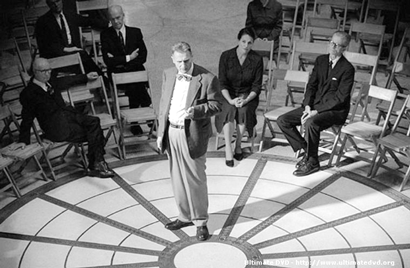Liam Neeson lends crusading passion to a Kinsey bravely resurrected by Bill Condon
Bill Condon’s “Kinsey,” starring Liam Neeson as pioneering American sex researcher Alfred C. Kinsey, is first and foremost a damned good movie.
The damnation is coming from the religious right who are appalled that Kinsey’s life is being celebrated on the big screen. And while it is important to see the film because of its social significance, it is also an imaginative and entertaining work of cinema that is funny, moving, and thought provoking.
Condon, the gay screenwriter who won an Oscar for his work in adapting Christopher Bram’s novel “Father of Frankenstein” for the film “Gods and Monsters” about the filmmaker James Whale, does double duty here as writer and director. In “Kinsey,” he tackles one of the most controversial figures of the 20th century, the entomologist who gradually turned his scientific passion from gall wasps to the sexual behavior of Homo sapiens.
Kinsey’s best-selling 1948 study “Sexual Behavior and the Human Male” and 1953 report on U.S. females were, as the film wryly illustrates, atom bombs exploding myths about what “normal” sexual behavior was. The data he and his Indiana University team gathered on heterosexual activity was shocking to the post-war public. Their findings on homosexual behavior—37 percent of men had engaged in it as adults and 10 percent were predominately homosexual—were no less than revolutionary in a society that barely acknowledged that gay people existed.
Neeson was an inspired choice to play Kinsey, bringing the same crusading passion that he brought to portraying Irish freedom fighter Michael Collins in the film of the same name, persecuted everyman John Proctor in Arthur Miller’s “The Crucible” on Broadway, and Oscar Wilde just before his imprisonment in David Hare’s “Judas Kiss.”
While Condon captures well the drama of Kinsey’s public and academic fights to tell the truth about human sexuality, he interweaves that story with the professor’s personal life, especially with his wife Mac and community of research collaborators.
Linney as Clara “Mac” McMillen is a long way from her breakthrough role as cute, pert Mary Ann Singleton on TV’s “Tales of the City.” Here she dares to be drab in appearance, while embodying a dynamic, smart, and sometimes mischievous woman. She both loves Kinsey deeply and struggles with the personal consequences of his opening the Pandora’s boxes of sexuality in America and in himself.
Condon does not flinch from delving into Kinsey’s kink or his relations with men (he was a self-described 3 on his 0-6 scale of hetero- to homosexual), particularly his bisexual assistant Clyde Martin, underplayed beautifully by Peter Sarsgaard, with whom he has a liaison while on the road.
One the greatest strengths of the film is in capturing the monumental nature of the task Kinsey and his colleagues set for themselves—interviewing a total 18,000 Americans about their sexual histories. There are more than a hundred speaking roles in this movie, which was shot in and around New York (rather than Kinsey’s Indiana base) and benefited enormously from the wealth of stage actors here. These diverse men and women are able to project in a few seconds of screen time the personalities of their characters, humanizing the data that make up Kinsey’s report.
Among these crucial cameos are gay men played by John “Lypsinka” Epperson and Jefferson Mays, who just completed a Tony-winning run playing 35 characters in the one-man “I Am My Own Wife” on Broadway. Harley Cross gives a more extended interview of what was like to be a gay man in those Dark Ages. All are fine as is John Lithgow in the role of Kinsey’s tyrannical father.
But the emotional peak of the film is delivered in one three-minute scene by Lynn Redgrave as a lesbian subject of the study, telling Kinsey how his revelations saved her life. It is a profoundly moving summation of how this man’s work contributed not just to scientific understanding of behavioral phenomena, but to human self-knowledge.
Redgrave deserves an Academy Award and there may very well be a slew of them in store for Condon and his cast, including wonderful period production design by Richard Sherman.
The film lets us laugh at the depth of ignorance and prejudice about sexual behavior just 50 years ago. But it comes at a time when the United States is in a renewed uproar over sex and religious conservatives are doing everything in their power to stop sex education and curtail any scientific inquiry into the subject. Just read Esther Kaplan’s new book, “With God on Their Side,” on the outrageous placement of religious zealots in the Bush administration’s oversight of everything from science and health to foreign policy.
Condon has provided us with an inspirational story of how a few brave and dedicated people can stand up to that kind of prejudice—and how lives depend on how well we follow in Alfred Kinsey’s footsteps.



































